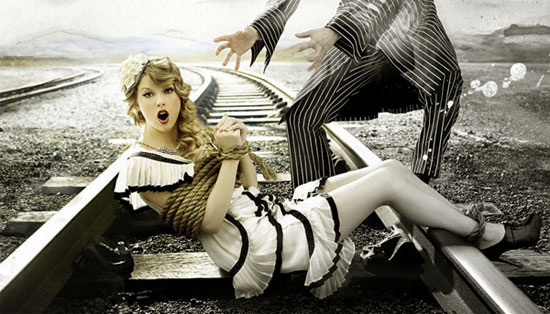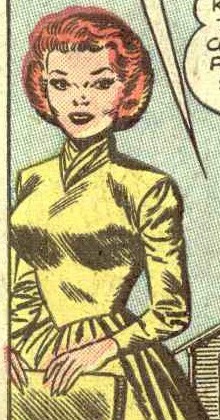
The Damsel-in-Distress complex is quickly introduced within the Captain America comics through the character of Betsy Ross. Below, a close reading has been conducted of a sequence of panels documenting this phenomena displayed through the likes of Ms. Ross.
At the beginning of the pages sequence, a busty and womanly Betsy Ross comes into clear view for the reader as two men observe her presence. They discuss the faults in her thinking and note that she may be unwelcome or an odd fixture to the current setting. The scene itself sets up the rather confident looking Betsy Ross to carry the expectation of stupidity or a lack of sophisticated intelligence while the guards are all knowing and correct in their assumptions.
Betsy goes on to exclaim her troubles and to draw greater attention to her damsel-in-distress state of being. Once again, her figure is quite prominent to the setting of the scene and even the face she’s making feels to give off rather sexual connotations. Betsy is immediately made into a character to be appreciated for looks and not personality. In response to her concerns, the men offer to help.

Ms. Ross explains that Captain America is no where to be found, hence she must seek help in others. She has been falsely accused of an illegal act and must seek the help of many in order to reach a solution, as depicted by the vast number of men in the picture offering their services. The immediate comment on the presence of Captain America furthers her unintelligent depiction as the reader is fully aware of the Captain who stands directly in front of Betsy. This tactic provides comic relief to the subject but only further works against Betsy’s credibility.
Betsy Ross and Will Benson then work in tandem to describe the root of their problems, stating that they only seek to cover media from a “human interest angle”, but for some reason unbeknownst to the pair, a secret of war becomes leaked in their papers. Captain America questions for further details. Facial expressions are greatly apparent to enhance the concern of Betsy and Captain America in contrast with the look of mischief of Will Benson’s face.
Will is next quick to rid himself of the blame and guilt of the occurring instances while the reader remains fully in view of the fear on Betsy’s face. Betsy sees her editor and becomes excited as the prospect of sharing more information through him. Betsy, while a prominent female character, is depicted as answering to a man, subtly addressing the idea that women are not fit to hold higher ranking office positions. She additionally is in need of more information from her editor in order to fully describe her situation rather than being able to handle seek aid all on her own.
In the following panel, the editor exclaims that he has “every faith” in Betsy, fully believing that she is innocent of the accused charges. Even despite his public show of confidence in Betsy ability to be a strong and assertive figure, Betsy concedes to the painting of her damsel-in-distress imagery by announcing that she wishes she had the help of Captain America. Once again, the reader is reminding of his imminent presence and her lack of ability to recognize this fact.
The editor then explains that he will contact the super hero for her due to their close friendship. Captain America and his sidekick overhear this conversation and look upon one another in acknowledgement of the adventure that will soon ensue.
I am deeply disappointed in the way that Betsy Ross is drawn as a character with little confidence and a lack of credibility. Panel after panel, back and forth between herself and the male characters surrounding her reinforce this idea that she stands totally incapable of handling herself and solving her own problems.

I love how detailed you were with this analysis, and it pains me to see how women were represented in comics when they originally came out. One of the most significant lines in your article was “Betsy is immediately made into a character to be appreciated for looks and not personality”, and she is not given a purpose at all. I remember in one of the original issues, the first thing Bucky says about her is “Gosh, she’s pretty”. And that’s it. She has no purpose other than serving as a plot device to be used against Captain America. She is the love interest, the one to be saved, and nothing more. She is a reporter, which should imply that she is a smart and strong investigator, but instead she never gets anywhere with her reports and constantly either runs into help, or runs to Captain America for help. Perspective definitely changed some when Wonder Woman came out, but it’s interesting how during World War II, women stepped up to the plate and took all of the men’s jobs, and they still don’t get any credit.
LikeLike
This comic is truly ridiculous in my opinion. I very much agree with your interpretation of Betsy Ross. It’s hard to believe this wasn’t immediately received with scrutiny. The very introduction of Betsy Ross, in the sequence you provide, is scoff-able. She is immediately advertised as a naive, misguided “girl” by so confidently and openly denying Steve Rogers’ association with Captain America while, in reality, I highly doubt someone would be that blatantly rude to someone from whom she is requesting help.
LikeLike
You’ are absolutely correct in pointing out her introduction being ridiculous in the comic. The way she is introduced pre-conditions the reader to assume particular notions about her stature and intellect. Unfortunately, the writer clearly intended for her to be interpreted in the manner described by the close reading, and thus the writer successfully executes a number of strong tactics, including the style and circumstances of her introduction, to ensure what the reader’s opinion of Betsy will be.
LikeLike